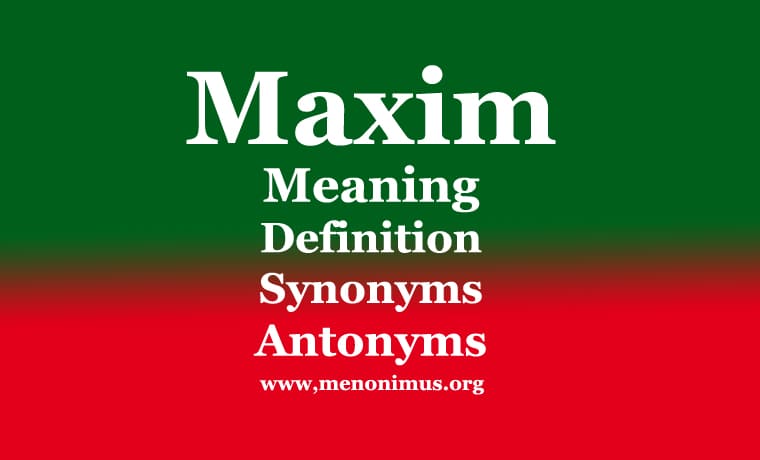Discover the significance of maxims in our comprehensive guide. Learn the meaning of maxims, their usage, synonyms, antonyms, and their impact on society. Explore the historical background, types, and relevance of maxims in contemporary life. Perfect for understanding these concise statements of wisdom and their timeless advice.
Maxim: Meaning, Definition, Usage, Forms, Synonyms, Antonyms, and Comprehensive Guide
Maxim: Meaning & Definition
A ‘maxim’ is a short, concise statement that expresses a general truth, principle, or rule of conduct. Maxims are often memorable and are used to convey practical wisdom or advice. They are similar to proverbs but tend to be more focused on principles or rules for behavior.
Example Sentence
‘Honesty is the best policy’ is a maxim that emphasizes the importance of truthfulness in all situations.”
Forms of the Word “Maxim”
Noun: Maxim
Definition: A short, pithy statement expressing a general truth or rule of conduct. Example: “The maxim ‘Actions speak louder than words’ is widely accepted as a truth about human behavior.”
Verb Form: There is no verb form for the word “maxim.” The term is exclusively used as a noun.
Adjective Form: There is no specific adjective form for “maxim.” However, the term “maximatic” could be used in theoretical contexts, though it is rarely used. Example: “The maximatic approach to ethics simplifies complex moral questions into general principles.”
Other Forms: There are no widely recognized other forms of the word “maxim.”
Synonyms for Maxim
Aphorism: A brief statement that expresses a general truth or principle in a concise and witty manner. Example: “The aphorism ‘Time flies’ captures the fleeting nature of time.”
Proverb: A short, well-known saying that expresses a general truth or piece of advice. Example: “The proverb ‘A stitch in time saves nine’ advises taking early action to prevent larger problems.”
Adage: An old and well-known saying that expresses a common experience or observation. Example: “The adage ‘An apple a day keeps the doctor away’ emphasizes the importance of healthy eating.”
Motto: A short phrase or slogan that expresses a guiding principle or ideal. Example: “The motto ‘Live and let live’ promotes tolerance and coexistence.”
Saw: An old, familiar saying that is often repeated. Example: “The saw ‘Beggars can’t be choosers’ reflects the idea that people without options must accept what is available.”
Antonyms for Maxim
Misconception: A wrong or mistaken idea or belief. Example: “The misconception that ‘money buys happiness’ is widely disputed.”
Falsehood: A false statement or belief. Example: “The falsehood that ‘the Earth is flat’ has been debunked by scientific evidence.”
Nonsense: Statements or ideas that lack sense or meaning. Example: “The idea that ‘you can always get something for nothing’ is considered nonsense.” 0 0 0
You May Like: Holistic
Essay on Maxims
Introduction
Maxims are concise statements that encapsulate fundamental truths or principles about life, behavior, and human nature. These statements are valued for their simplicity and their ability to convey wisdom in a memorable way. In this essay, we will explore the meaning of maxims, their historical significance, various types of maxims, their functions in society, and their relevance in contemporary life.
Historical Background
Maxims have been a part of human communication since ancient times. They are found in the works of philosophers, writers, and thinkers across different cultures and eras. For example, the ancient Greek philosopher Aristotle often used maxims to convey ethical principles, while the Roman statesman Cicero employed maxims in his rhetorical works. Throughout history, maxims have been used to educate, persuade, and guide behavior.
Types of Maxims
Ethical Maxims: These maxims guide moral behavior and principles. For example, “Do unto others as you would have them do unto you” is an ethical maxim that promotes the principle of reciprocity and empathy.
Practical Maxims: These maxims offer advice on practical aspects of life, such as work, health, and relationships. For instance, “Early to bed and early to rise makes a man healthy, wealthy, and wise” is a practical maxim that emphasizes the benefits of a disciplined lifestyle.
Philosophical Maxims: These maxims express fundamental truths about human existence and the nature of reality. For example, “Know thyself” is a philosophical maxim that encourages self-awareness and introspection.
Functions of Maxims
Educational Tool: Maxims are often used as educational tools to teach important life lessons and values. Their brevity and clarity make them easy to remember and apply in various situations.
Cultural Preservation: Maxims help preserve cultural values and norms by encapsulating the wisdom of previous generations. They serve as a bridge between the past and the present, ensuring that important principles are passed down through time.
Social Commentary: Maxims often provide commentary on societal norms and human behavior. They can critique social practices, highlight common experiences, or offer insights into human nature.
Relevance in Contemporary Life
In today’s fast-paced world, maxims continue to hold relevance. They are used in everyday conversations, literature, media, and personal reflections to convey wisdom and advice. The simplicity and universality of maxims make them effective tools for communication and guidance.
In Communication: Maxims are frequently used in speeches, presentations, and casual conversations to emphasize points or provide guidance. They add depth to discussions and can make complex ideas more relatable.
In Media and Advertising: Maxims are often employed in advertising slogans and media content to appeal to audiences. Their familiarity and succinctness make them effective tools for capturing attention and conveying messages.
In Personal Reflection: Many people use maxims for personal reflection and motivation. Maxims such as “Carpe diem” (seize the day) inspire individuals to live fully and make the most of each moment.
Famous Maxims and Their Impact
Throughout history, certain maxims have gained widespread recognition and have had a significant impact on society. For example, the maxim “The pen is mightier than the sword” emphasizes the power of words and ideas over physical force. This maxim has inspired countless individuals to use their voices and writing to effect change.
Another well-known maxim is “Actions speak louder than words,” which highlights the importance of deeds over mere promises. This maxim underscores the value of integrity and accountability in personal and professional relationships.
Conclusion
Maxims are valuable tools for conveying wisdom, guiding behavior, and preserving cultural values. Their brevity and clarity make them accessible and memorable, allowing them to resonate across different contexts and generations. As we navigate the complexities of modern life, maxims continue to provide timeless insights and practical advice, highlighting the enduring relevance of these concise statements of truth.
FAQs on Maxim
1. What is a maxim?
A maxim is a short, concise statement that expresses a general truth, principle, or rule of conduct. It is used to convey practical wisdom or advice.
2. How are maxims used in everyday life?
Maxims are used in everyday conversations, literature, media, and personal reflections. They help convey important messages, provide guidance, and add depth to communication.
3. Can maxims vary between cultures?
Yes, maxims can vary between cultures. Each culture has its own set of maxims that reflect its unique values, experiences, and traditions.
4. Are there any verb or adjective forms of the word “maxim”?
The word “maxim” is used exclusively as a noun. There is no widely recognized adjective form, although “maximatic” might be used in theoretical contexts. There is no verb form for “maxim.”
5. What are some synonyms for the word “maxim”?
Some synonyms for “maxim” include aphorism, proverb, adage, motto, and saw.
6. What are some antonyms for “maxim”?
Antonyms for “maxim” include misconception, falsehood, and nonsense.
7. Why are maxims important?
Maxims are important because they convey timeless wisdom, reflect cultural values, and provide guidance on how to live a virtuous and meaningful life. They help preserve cultural identity and offer insights into human nature.
8. How can I use maxims effectively?
To use maxims effectively, choose ones that are relevant to the context and message you want to convey. Use them to emphasize points, provide advice, or add depth to your communication.
This extensive guide aims to provide a thorough understanding of maxims, their significance, and their application in various aspects of life. The simplicity and universality of maxims make them valuable tools for conveying wisdom and advice. 0 0 0.
N. B. If you found the article helpful, we’d love to hear your thoughts and feelings. Your suggestions and constructive feedback are warmly welcomed!











